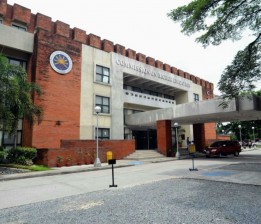MANILA, Philippines – Colleges and universities can no longer enforce “no permit, no exam” policy.
The Commission on Higher Education (CHEd) has ordered all 1,800 higher education institutions (HEIs) in the country to make sure low-income students get access to financial aid if they can not meet the deadline for paying tuition.
The order came with new policy guidelines that CHEd issued last April 19, requiring HEIs to provide holistic student affairs and services programs, including scholarship and financial assistance.
“There shall be mechanisms for HEIs to institutionalize more compassionate policies and guidelines particularly for those students belonging to the vulnerable and marginalized sectors of our country,” CHEd Chairperson Patricia Licuanan said in the CHEd Memorandum Order 9 series 2013.
“The HEIs must provide access on any financial assistance in cases where the(se) students can not pay on the particular moment,” she continued.
“In no case shall the HEI implement a ‘no permit, no examination’ policy in case of financial incapacities of the(se) students,” Licuanan stressed.
It is a common practice in colleges and universities for students who were not able to meet the deadline for tuition payment to be denied taking their final exams.
The University of the Philippines (UP) has this month scrapped the ‘no late payment’ of tuition policy as a result of the furor over the case of 16-year Kristel Tejada, a UP Manila freshman.
Tejada, the eldest of four children whose father was laid off from work in the middle of the school year, committed suicide last March 15, two days after she had to take a leave of absence because she could not pay her tuition for the second semester.
CHEd has required colleges and universities to provide a Student Affairs and Services (SAS) office that will provide its students a package of services, including guidance and counseling, career and job placement, economic enterprise development and scholarship and financial assistance.
“There shall be student scholarships and financial assistance in various forms and accessible modalities available to students, with appropriate screening and monitoring procedures and guidelines understood by applicants and recipients,” Licuanan said in the order.
These SAS offices shall also supervise student activities, accredit student organizations and implement disciplinary and grievance mechanisms.
CHEd said there should be rules on student misconduct such as “vandalism, exaggerated utterances, irresponsible and libelous statements and other acts of militancy that threaten peace and order and public and private properties inside and outside the HEIs.”
Tertiary schools were also required to provide services for safe and healthful food; primary health care; safety, security and crime prevention; and student housing by providing students with a list of available dormitories.
Schools are further required to provide their students multi-faith services, promote culture and arts and sports development, promote community development and attend to students with special needs and disabilities.
Through the SAS office, schools were also told to promote programs catering to the economic needs of students such as setting up student cooperatives, having entrepreneurial and income-generating projects and promoting savings.
HEIs currently operating are given three years or until 2017 to fully comply with the new guidelines, while new tertiary schools were told to strictly comply effective this school year.
